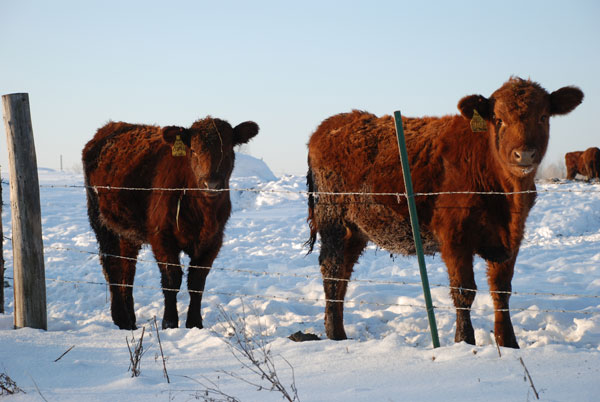Itching and rubbing in your herd? Lice treatment may be necessary
The coming of winter means the coming of lice. Now is the time to treat.
November 7, 2019

Source: Kansas State University
Lice infections in cattle are not anything any rancher wants to see; the pests hurt profits. The sad fact is that every herd has some level of infestation. Lice affects cows, stockers and feedlot cattle, hurting their performance from December through March.
Ranch losses because of lice
The USDA has estimated that livestock producers lose up to $125 million per year due to effects of lice infestations. Not only can they be the cause of direct animal performance losses, but also increases wear and tear on facilities and fences. The direct losses to cattle come in forms of decreased average daily gains (documented 0.25 pounds per day reduction in growing calves), skin infections, and potentially blood loss and anemia.
Two types of cattle lice
There are two different types of lice that infect cattle. Biting lice feed on the skin and secretions on the outside of the animal. The other type is known as sucking lice. These species are blood feeders and pierce the skin.
Both types of lice spend their entire lifecycles on the cattle hosts. Off of cattle they survive very poorly and generally only last a few days. However, they can live up to 10 days off host in the right environment, leading to reinfection in groups of animals.
It is important to note that lice are host species specific. This means that cattle lice cannot affect people, horses, or any other species.
In general, every herd has some level of lice infestation. Lice are carried from season to season by a small percentage of the herd that act as reservoir hosts.
Adults lay eggs on the hair of infected animals. Overall lifecycle for an egg to mature into an adult, and lay eggs is roughly 28 days. Most females lay one egg per day.
Lice symptoms
Clinical signs of lice infected cattle generally begin with constant rubbing and scratching within the herd. Fences, posts, water troughs, trees and any other stationary object could be subject to damage from this rubbing. As the infection and irritation continues, large hairless patches will become evident on animals.
Further diagnosing the issue beyond the clinical signs requires seeing the adult lice on the skin. Parting the hair will reveal the lice. They are very small but can still be seen. They are roughly the size of a grain of sand. The economic threshold for treatment is roughly 10 lice per square inch.
Lice treatment
There are several options when it comes to treatment of lice in cow herds. One option is the macrocyclic lactone class of endectocides. Examples of products in this class include ivermectin, doramectin, eprinomectin, and moxidectin.
These products come in pour-on and injectable formulations. Macrocyclic lactones treat internal intestinal nematodes, but also work on external parasites such as lice. It is important to note that the injectable formulations do not work on biting lice since they do not blood feed.
These products are most often used on a herd basis at the end of summer grazing going into winter. Even with herd treatment in the fall, later season lice infections can still occur. This can be due to fence line contact with other animals, or introduction of new animals.
The other option is topical treatments that are non-systemic. These products are typically pyrethroid products similar to what is commonly used to control horn flies during the summer months.
These products are very effective against the adult lice, but to not affect the larvae or eggs. Retreatment is often indicated 14 days after initial treatment.
There is a product available that is a pyrethroid in combination with an IGR (insect growth regulator) that not only works very well against the adults, but also works against the eggs and larvae. Use of this particular product eliminates the need to retreat in 14 days.
Since these topical formulations kill lice by contact, it is extremely important to apply them appropriately to cattle. Most formations call for the pour-on to be applied with full coverage on the topline of animals, from poll to the trailhead.
When treating cattle, it is also important to treat the entire group. Missing one animal could serve as the reservoir for reinvesting the entire herd.
The same thought should be given to new additions to the herd from an outside source. Basic biosecurity such as treating and segregating new additions for 30 days is not only good to reduce risk of lice, it is also a great tool in decreasing introduction of other diseases.
Tarpoff is Extension veterinarian with Kansas State University. Source: Kansas State University, which is solely responsible for the information provided and is wholly owned by the source. Informa Business Media and all its subsidiaries are not responsible for any of the content contained in this information asset.
You May Also Like


.png?width=300&auto=webp&quality=80&disable=upscale)
